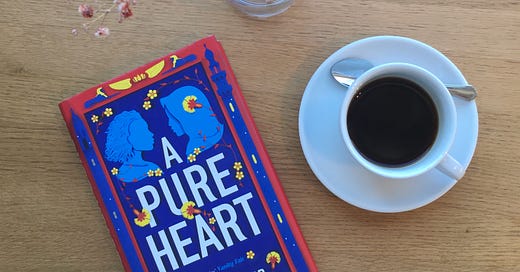Welcome to Bookmarked, a weekly newsletter following my journey as I read one book from every country. If you like the sound of my project, why not share this newsletter with a friend?
I was excited to read Rajia Hassib’s A Pure Heart. Hassib’s first novel, In the Language of Miracles, was a New York Times Editors' Choice. I loved her New Yorker essay on being an American Muslim. And, as someone who speaks to her sister at least twice a day, I knew I’d enjoy a novel unpicking the intricacies of sisterhood.
Though Hassib, who moved from Egypt to the US in her early twenties, writes in English, there’s a whole world of contemporary Egyptian fiction in translation out there. The best resource I found is Arab Lit Quarterly, a literary journal and blog containing a wealth of articles and essays about contemporary Arabic literature. On writing by Egyptian authors, it covers everything from queer characters to children’s magazines and YA and science fiction. It’s definitely worth checking out.
But onto A Pure Heart, a commanding novel about the emotional distance that can easily grow between families separated by oceans.
The novel’s main characters are Rose and Gameela, two Cairo-born sisters whose lives have taken wildly different paths. While Rose emigrates to New York to study, lands a curatorial job at New York’s Metropolitan Museum, and marries an American journalist, Gameela, “the only covered woman in the entire family, rebellious in her conservatism,” takes an engineering job in Cairo and chooses to live with her parents. Rose is baffled by Gameela’s commitment to Islam; Gameela is equally confounded by Rose’s willingness to up and leave her own country.
We meet Rose in post Arab Spring Egypt as she’s sorting through Gameela’s belongings in their parents' home. Rose is performing a sort of excavation, hoping to uncover anything that may go some way towards explaining her sister’s death in a seemingly random suicide bombing. She’s racked with guilt, unable to shake the feeling that she could’ve called more, could’ve asked more questions, could’ve somehow intervened and saved Gameela’s life.
“She wants to say that she lies awake at night thinking of the endless ways she has not helped Gameela, regretting all the times she almost picked up the phone but got too wrapped up in the hustle of life and postponed the call. For weeks, she has imagined the things Gameela might have told her, if they had spoken more often… whispering one detail that Rose may have responded to and somehow changed the course of fate. No, don’t do that. But don’t do what? What single misstep on the trail that led to Gameela’s death could Rose have prevented on the phone?”
Rose’s husband Mark plays a major role in driving a wedge between the sisters. While Rose’s parents have always been fond of Mark, an Egyptology scholar and foreign correspondent who converted to Islam before marrying Rose, Gameela doubts his authenticity.
But then everything changes. When Mark spontaneously visits Cairo on a journalistic assignment, Gameela seems different, “surprisingly relaxed in his presence”. At the time, Mark thinks nothing of it. Only later does he learn about the changes in Gameela’s life that prompt this shift in their relationship.
A Pure Heart jumps backwards and forwards in time, switching between its various characters’ points of view—including Saaber, the twenty-one-year-old suicide bomber. It’s a narrative technique that Hassib uses to dramatic effect: the reader learns what happened to Gameela before Rose does.
A Pure Heart paints a crushing picture of the legal injustices of post-revolution Egypt under General Sisi’s dictatorship. It’s a rich story that digs deep into issues of class, religion, politics, and postcolonialism, offering a careful and insightful take on how secrets can drive people apart. Hassib is an astonishingly percipient character writer who is at her best when she’s examining how individuals act, and interact, under tremendously stressful circumstances.
In a pacy 305-pages, A Pure Heart tells an immersive story that draws you in from the very first page.
A Pure Heart by Rajia Hassib (Sceptre, 2019)
More books by Egyptian authors
Here’s a list of the other recommendations I received this week:
In the Spider’s Room by Muhammad Abdelnabi, tr. Jonathan Wright
Brooklyn Heights by Miral al-Tahawy, tr. Samah Selim
Siraaj: An Arab Tale by Radwa Ashour, tr. Barbara Romaine
The Queue by Basma Abdel Aziz, tr. Elisabeth Jaquette
The Man from Bashmour by Salwa Bakr, tr. Nancy Roberts
Women of Karantina by Nael Eltoukhy, tr. Robin Moger
Cigarette Number Seven by Donia Kamal, tr. Nariman Youssef
Washes, Prays by Noor Naga
Otared by Mohammad Rabie, tr. Robin Moger
The Crocodiles by Yūsuf Rakhā, tr. Robin Moger
The Map of Love by Ahdaf Soueif
What have you read recently?
If you’ve read a brilliant book in translation or want to pass on a recommendation, I’d love to hear about it! For this project, I’m focussing on contemporary fiction and short stories, with a preference for female authors—but I won’t be too dogmatic about it so do share recommendations that don’t quite fit the bill, too.
You can get in touch by replying to this email or leaving a comment. I’ll be featuring your recommendations in upcoming newsletters, and I’ll keep a growing list here.
Bookmarked is written by Tabatha Leggett. Thank you to Noor Naga, Sahar El Mougy, Richard Jacquemond, and Marcia Lynx Qualey from Arab Lit Quarterly, for their recommendations for this issue. If you think someone you know would enjoy this newsletter, please forward it to them!




